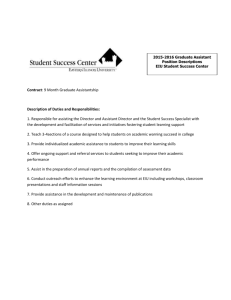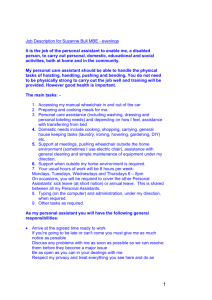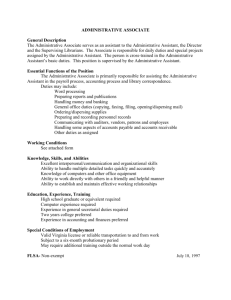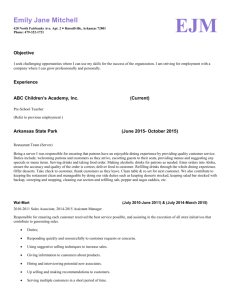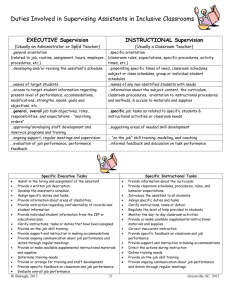JOB MATRIX – LIBRARY ASSISTANTS SERIES 1
advertisement
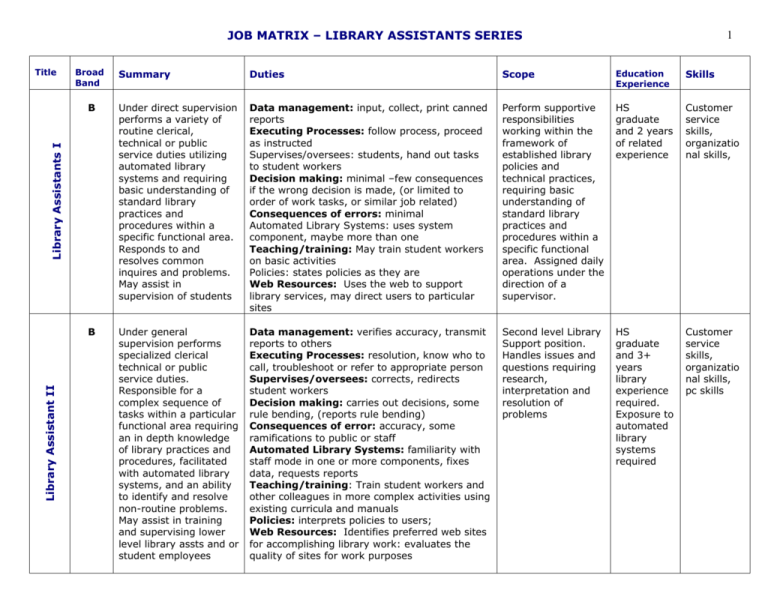
JOB MATRIX – LIBRARY ASSISTANTS SERIES Broad Band Summary Duties Scope Education Experience Skills B Under direct supervision performs a variety of routine clerical, technical or public service duties utilizing automated library systems and requiring basic understanding of standard library practices and procedures within a specific functional area. Responds to and resolves common inquires and problems. May assist in supervision of students Data management: input, collect, print canned reports Executing Processes: follow process, proceed as instructed Supervises/oversees: students, hand out tasks to student workers Decision making: minimal –few consequences if the wrong decision is made, (or limited to order of work tasks, or similar job related) Consequences of errors: minimal Automated Library Systems: uses system component, maybe more than one Teaching/training: May train student workers on basic activities Policies: states policies as they are Web Resources: Uses the web to support library services, may direct users to particular sites Perform supportive responsibilities working within the framework of established library policies and technical practices, requiring basic understanding of standard library practices and procedures within a specific functional area. Assigned daily operations under the direction of a supervisor. HS graduate and 2 years of related experience Customer service skills, organizatio nal skills, B Under general supervision performs specialized clerical technical or public service duties. Responsible for a complex sequence of tasks within a particular functional area requiring an in depth knowledge of library practices and procedures, facilitated with automated library systems, and an ability to identify and resolve non-routine problems. May assist in training and supervising lower level library assts and or student employees Data management: verifies accuracy, transmit reports to others Executing Processes: resolution, know who to call, troubleshoot or refer to appropriate person Supervises/oversees: corrects, redirects student workers Decision making: carries out decisions, some rule bending, (reports rule bending) Consequences of error: accuracy, some ramifications to public or staff Automated Library Systems: familiarity with staff mode in one or more components, fixes data, requests reports Teaching/training: Train student workers and other colleagues in more complex activities using existing curricula and manuals Policies: interprets policies to users; Web Resources: Identifies preferred web sites for accomplishing library work: evaluates the quality of sites for work purposes Second level Library Support position. Handles issues and questions requiring research, interpretation and resolution of problems HS graduate and 3+ years library experience required. Exposure to automated library systems required Customer service skills, organizatio nal skills, pc skills Library Assistant II Library Assistants I Title 1 JOB MATRIX – LIBRARY ASSISTANTS SERIES Title Broad Band Library Assistant III B 2 Summary Duties Scope Education Experience Skills Under minimal supervision performs skilled library duties at the paraprofessional level requiring an understanding of library-wide practices and procedures as well as specialized knowledge of a specific library functional area. Accesses, analyzes, edits and/or inputs data into various automated library databases for the purpose of processing, retrieving, and/or maintaining information within a specific functional area. May supervise lower level Library Assistants and/or a large number of student employees. Data management: Interprets, customizes, creates reports, analyze data Execute processes: problem resolution, amend process, quality assurance, assures workflow, refer with recommendations to appropriate person. Supervises/oversees: hire, counsel and discharge student workers. Directs regular staff. Decision-making: Independent decision making, employee supervision. Makes decisions involving money, makes policies, can break rules, approves rule bending of other staff. Consequences of error: supervision, money, policies, public use – affects Automated Library Systems: Knows how millennium works (patron records, bibliographic records, loan rules…) Can answer/figure out why something happened, talks to CLIC office Teaching/training: Develop curricula, training materials and instruct others (library patrons and library staff) regarding the use of software/hardware applications Policies: Writes, gets sign off with appropriate people; communicate changes; breaks rules Web Resources: Develops uses for web sites including managing a departmental web site: implementing software dependent on web technology (e.g. Blackboard); supports University web page development; may design forms, photos, import & place images, etc for use on the web; may develop and maintain portions of the library’s web pages. Highest level Library support either in a specialized area or as a single support for a branch library requiring in-depth knowledge of library wide practices and procedures with autonomy to amend or create new. 2 years of college and 2 years of library experience required including automated library systems. College degree may be required in certain positions Customer service skills, organizatio nal skills, pc skills, supervisory skills, analytical skills JOB MATRIX – LIBRARY ASSISTANTS SERIES How to interpret the Library Assistant job matrix There are three job levels reflecting the Library Assistant series (i.e., Library Assistant I, Library Assistant II, Library Assistant III). Each description provides a summary of duties and scope as well as the corresponding factors, which reflect specific skills, education/experience, and complexity typically expected at each level. All positions within the Library Assistant job matrix are unique to some degree, but for evaluation purposes every position has some attributes that are similar to other Library assistant positions across departments. In developing the job matrix, the Job Expert Team Committee determined that the matrix needed to be written general in nature. The matrix may not reflect all the functions provided by positions across campus and incumbents may not perform all the duties at one level. For example, a position may reflect duties at the Library Assistant I and II levels. The deciding factor is typically the proportion of work at which the employee spends the most time (i.e., 50% or more). Other factors may also be taken into consideration (e.g., the organizational structure, scope of responsibility, reporting relationship, etc.). 3
